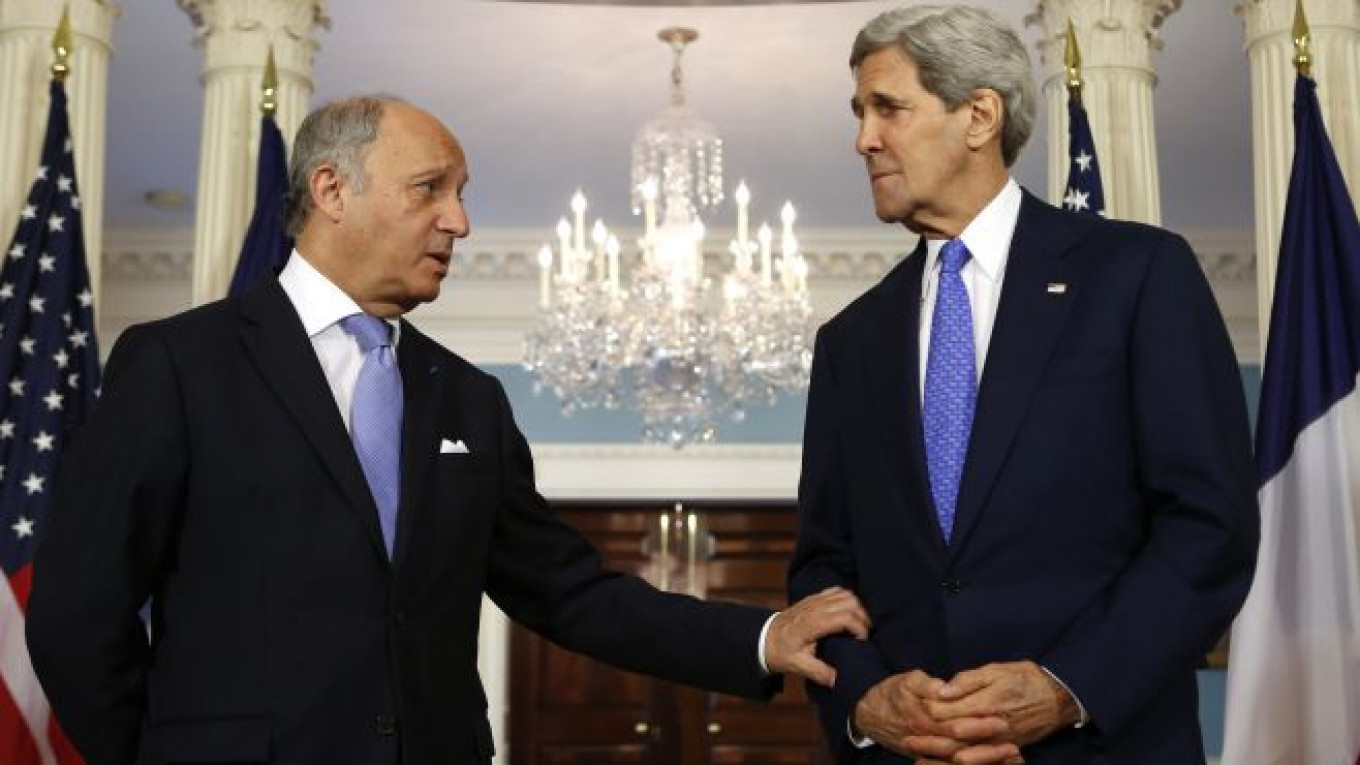France's foreign minister has said that other countries must share the burden in imposing sanctions on Russia and that any measures should also include the energy and financial sectors as well as defense.
Foreign Minister Laurent Fabius, speaking in an interview with CNN on Monday night, also suggested France had not ruled out reviewing the sale of warships to Russia — a contract agreed before the crisis in Ukraine broke out.
The U.S. has been pressing France, Germany and Britain to take a tougher line against Russia to punish Moscow for its annexation of Crimea and to dissuade it from intervening in eastern Ukraine.
Asked if France was on the same page as the U.S., Fabius said: "I think so, provided that everybody makes the same sacrifices" — a reference to other nations.
"It is not sanctions against Europe, but Russia. Let's not forget that," he said.
The European Union imposed sanctions on Monday on a senior aide to Putin and the commander of Russian paratroopers, as well as two confiscated Crimean energy companies.
But while EU powers Germany, France and Britain have all threatened tougher action against Moscow if it undermined the May 25 Ukrainian presidential election, they are hesitant to adopt sanctions that could harm their own interests.
For France, this would mean at least delaying the defense contract. For Britain, closing its mansions and bank vaults to magnates close to President Vladimir Putin. For Germany, it would mean reducing its dependency on Russian gas.
French diplomatic sources said Monday that Paris would press ahead with a 1.2 billion euro ($1.66 billion) contract to sell Mistral helicopter carriers to Russia because canceling the deal would do more damage to Paris than to Moscow.
"We have a rule. When there is a contract it will be implemented," Fabius said. "The decision will be taken next October, but if we make new sanctions it has to apply to the defense, financial and energy [sectors], not only for defense."
The first carrier, the Vladivostok, is due to be delivered by the last quarter of 2014. U.S. Assistant Secretary of State Victoria Nuland said last Thursday that she had qualms about the French deal after several U.S. lawmakers demanded Washington put pressure on France to send a strong message to Russia.
Fabius is due to meet U.S. Secretary of State John Kerry on Tuesday.
Moscow said Tuesday that sanctions imposed by Washington on Russian bank Tempbank over its dealings with the Syrian government were "absolutely unacceptable."
The U.S. Treasury put the small Moscow-based lender on its list of sanctioned entities last week, in effect cutting the bank off from the U.S. financial system.
"The United Nations Security Council has adopted no resolutions banning cooperation with Damascus, which means bilateral economic and financial ties are completely legitimate," the Foreign Ministry said in a statement.
Moscow has blocked efforts at the UN Security Council to mount pressure on the Syrian government, including by imposing sanctions, to end a three-year-old civil war.
Reuters reported last October that the Commercial Bank of Syria had opened accounts in Tempbank.
Tempbank also has ties with financial markets in China, Europe and the U.S., using Austria's Raiffeisen Bank as well as Russia's biggest state-owned bank Sberbank and a foreign branch of Russia's VTB as intermediaries, according to information on the bank's website.
"We would like to remind the U.S. side yet again that the language of sanctions is useless and counterproductive," the ministry said.
Washington has also imposed sanctions on Russia over the crisis in Ukraine, which has caused their worst standoff since the end of the Cold War more than two decades ago. (Reuters)
A Message from The Moscow Times:
Dear readers,
We are facing unprecedented challenges. Russia's Prosecutor General's Office has designated The Moscow Times as an "undesirable" organization, criminalizing our work and putting our staff at risk of prosecution. This follows our earlier unjust labeling as a "foreign agent."
These actions are direct attempts to silence independent journalism in Russia. The authorities claim our work "discredits the decisions of the Russian leadership." We see things differently: we strive to provide accurate, unbiased reporting on Russia.
We, the journalists of The Moscow Times, refuse to be silenced. But to continue our work, we need your help.
Your support, no matter how small, makes a world of difference. If you can, please support us monthly starting from just $2. It's quick to set up, and every contribution makes a significant impact.
By supporting The Moscow Times, you're defending open, independent journalism in the face of repression. Thank you for standing with us.
Remind me later.






